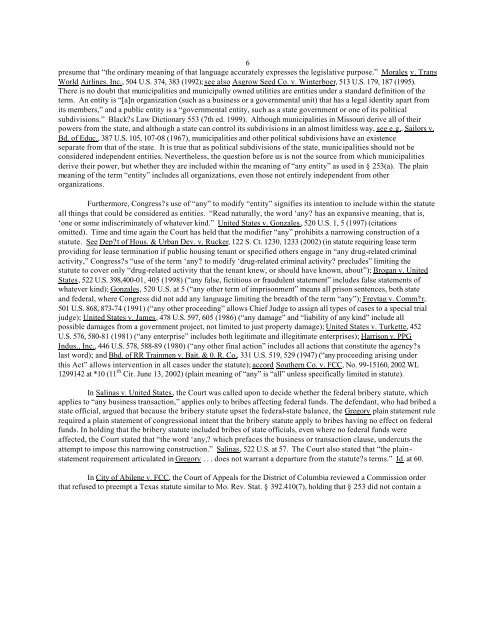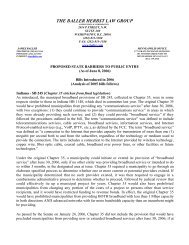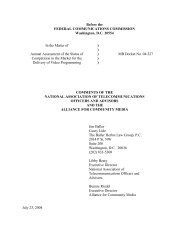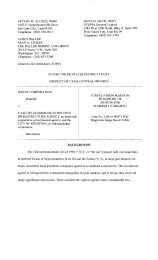Petition for Writ of Certiorari
Petition for Writ of Certiorari
Petition for Writ of Certiorari
Create successful ePaper yourself
Turn your PDF publications into a flip-book with our unique Google optimized e-Paper software.
6<br />
presume that “the ordinary meaning <strong>of</strong> that language accurately expresses the legislative purpose.” Morales v. Trans<br />
World Airlines. Inc., 504 U.S. 374, 383 (1992); see also Asgrow Seed Co. v. Winterboer, 513 U.S. 179, 187 (1995).<br />
There is no doubt that municipalities and municipally owned utilities are entities under a standard definition <strong>of</strong> the<br />
term. An entity is “[a]n organization (such as a business or a governmental unit) that has a legal identity apart from<br />
its members,” and a public entity is a “governmental entity, such as a state government or one <strong>of</strong> its political<br />
subdivisions.” Black?s Law Dictionary 553 (7th ed. 1999). Although municipalities in Missouri derive all <strong>of</strong> their<br />
powers from the state, and although a state can control its subdivisions in an almost limitless way, see e.g., Sailors v.<br />
Bd. <strong>of</strong> Educ., 387 U.S. 105, 107-08 (1967), municipalities and other political subdivisions have an existence<br />
separate from that <strong>of</strong> the state. It is true that as political subdivisions <strong>of</strong> the state, municipalities should not be<br />
considered independent entities. Nevertheless, the question be<strong>for</strong>e us is not the source from which municipalities<br />
derive their power, but whether they are included within the meaning <strong>of</strong> “any entity” as used in § 253(a). The plain<br />
meaning <strong>of</strong> the term “entity” includes all organizations, even those not entirely independent from other<br />
organizations.<br />
Furthermore, Congress?s use <strong>of</strong> “any” to modify “entity” signifies its intention to include within the statute<br />
all things that could be considered as entities. “Read naturally, the word ‘any? has an expansive meaning, that is,<br />
‘one or some indiscriminately <strong>of</strong> whatever kind.” United States v. Gonzales, 520 U.S. 1, 5 (1997) (citations<br />
omitted). Time and time again the Court has held that the modifier “any” prohibits a narrowing construction <strong>of</strong> a<br />
statute. See Dep?t <strong>of</strong> Hous. & Urban Dev. v. Rucker, 122 S. Ct. 1230, 1233 (2002) (in statute requiring lease term<br />
providing <strong>for</strong> lease termination if public housing tenant or specified others engage in “any drug-related criminal<br />
activity,” Congress?s “use <strong>of</strong> the term ‘any? to modify ‘drug-related criminal activity? precludes” limiting the<br />
statute to cover only “drug-related activity that the tenant knew, or should have known, about”); Brogan v. United<br />
States, 522 U.S. 398,400-01, 405 (1998) (“any false, fictitious or fraudulent statement” includes false statements <strong>of</strong><br />
whatever kind); Gonzales, 520 U.S. at 5 (“any other term <strong>of</strong> imprisonment” means all prison sentences, both state<br />
and federal, where Congress did not add any language limiting the breadth <strong>of</strong> the term “any”); Freytag v. Comm?r,<br />
501 U.S. 868, 873-74 (1991) (“any other proceeding” allows Chief Judge to assign all types <strong>of</strong> cases to a special trial<br />
judge); United States v. James, 478 U.S. 597, 605 (1986) (“any damage” and “liability <strong>of</strong> any kind” include all<br />
possible damages from a government project, not limited to just property damage); United States v. Turkette, 452<br />
U.S. 576, 580-81 (1981) (“any enterprise” includes both legitimate and illegitimate enterprises); Harrison v. PPG<br />
Indus., Inc., 446 U.S. 578, 588-89 (1980) (“any other final action” includes all actions that constitute the agency?s<br />
last word); and Bhd. <strong>of</strong> RR Trainmen v. Bait. & 0. R. Co., 331 U.S. 519, 529 (1947) (“any proceeding arising under<br />
this Act” allows intervention in all cases under the statute); accord Southern Co. v. FCC, No. 99-15160, 2002 WL<br />
1299142 at *10 (11 th Cir. June 13, 2002) (plain meaning <strong>of</strong> “any” is “all” unless specifically limited in statute).<br />
In Salinas v. United States, the Court was called upon to decide whether the federal bribery statute, which<br />
applies to “any business transaction,” applies only to bribes affecting federal funds. The defendant, who had bribed a<br />
state <strong>of</strong>ficial, argued that because the bribery statute upset the federal-state balance, the Gregory plain statement rule<br />
required a plain statement <strong>of</strong> congressional intent that the bribery statute apply to bribes having no effect on federal<br />
funds. In holding that the bribery statute included bribes <strong>of</strong> state <strong>of</strong>ficials, even where no federal funds were<br />
affected, the Court stated that “the word ‘any,? which prefaces the business or transaction clause, undercuts the<br />
attempt to impose this narrowing construction.” Salinas, 522 U.S. at 57. The Court also stated that “the plainstatement<br />
requirement articulated in Gregory . . . does not warrant a departure from the statute?s terms.” Id. at 60.<br />
In City <strong>of</strong> Abilene v. FCC, the Court <strong>of</strong> Appeals <strong>for</strong> the District <strong>of</strong> Columbia reviewed a Commission order<br />
that refused to preempt a Texas statute similar to Mo. Rev. Stat. § 392.410(7), holding that § 253 did not contain a






